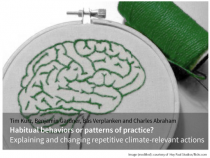- About
- Team
- Projects
- Children and the Environment
- ELiCiT (Exploring lifestyle changes in transition)
- Foundations for Sustainable Living
- HABITs
- Mapping Rebound Effects
- PASSAGE (Prosperity and Sustainability in the Green Economy)
- Policy Dialogue
- Price Responsiveness of Demand in Energy
- Resilience and Sustainable Lifestyles
- Sustainability Transitions in Food Systems
- Sustainable Living in Remote Rural Scotland
- Publications
- News
- Events
People or places? Factors associated with the presence of domestic energy efficiency measures in England
| Title | People or places? Factors associated with the presence of domestic energy efficiency measures in England |
| Publication Type | SLRG Working Paper |
| Year of Publication | 2013 |
| Authors | Leicester, A, Stoye, G |
| Volume | 01-13 |
| Abstract | We use English household-level survey data from 1996 to 2010 to explore whether economic market failures play a significant role in explaining the presence of energy efficiency measures (loft insulation, cavity wall insulation and full double glazing) in residential properties. There appears to be a limited role for credit constraints as proxied by income, receipt of means-tested benefits or educational attainment. Private renters are significantly less likely to own efficiency measures suggesting that failures in the landlord-tenant relationship in the private-rented sector are a key barrier to uptake. More broadly, we find that it is the characteristics of the dwelling rather than those of the occupants which are the most significant explanatory factors. Our results suggest that well-targeted policies to encourage take-up of efficiency measures could focus on private landlords, long-term owner occupiers, those in older properties and those using non-metered fuels as their main heating source. However the key target groups vary across different efficiency measures. |













